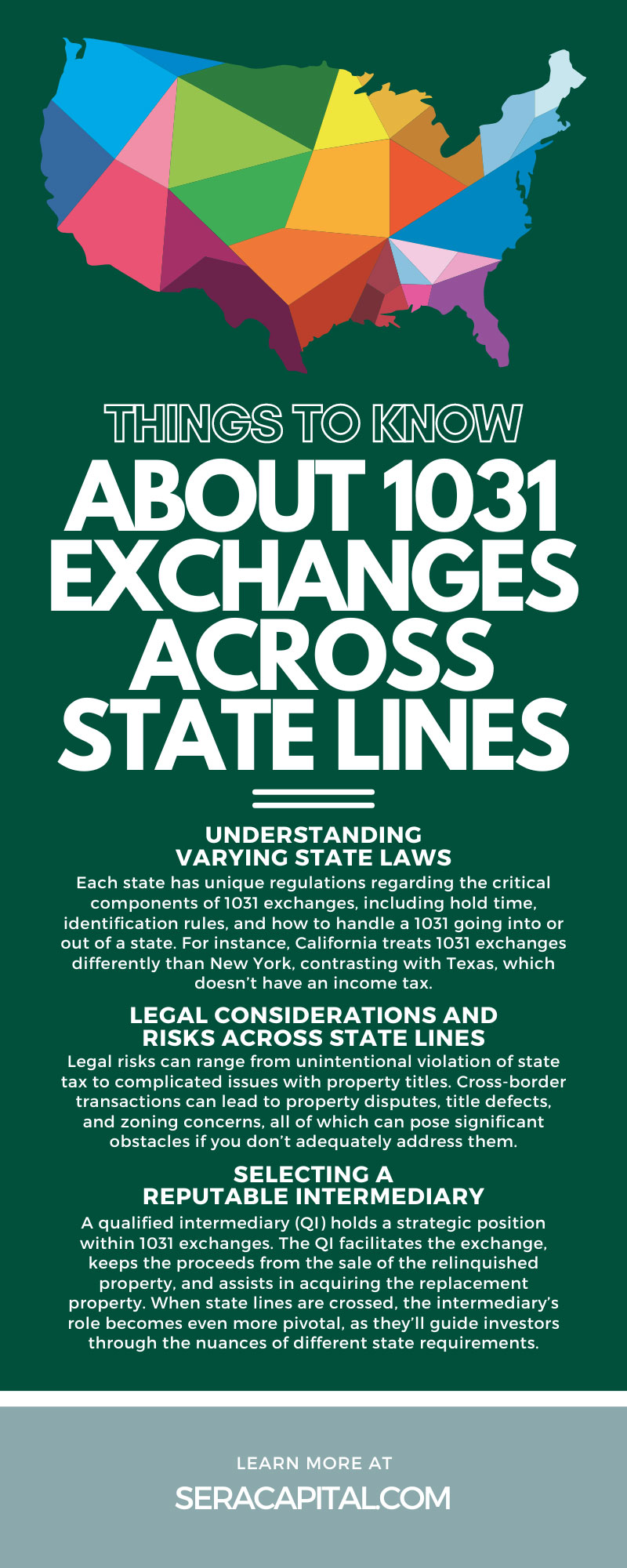Things To Know About 1031 Exchanges Across State Lines

Carl E. Sera, CMT
March 27, 2024
Navigating the intricate process of a 1031 exchange requires a discerning eye and a willingness to engage with the specifics of the real estate market. Introduce the complexity of crossing state lines into the mix, and the picture becomes even more detailed. This extensive guide will explore the nuances of executing 1031 exchanges across state lines.
Understanding 1031 Exchanges
A 1031 exchange, named after Section 1031 of the Internal Revenue Code, is a transaction that allows an investor to defer capital gains taxes by reinvesting the proceeds from the sale of one property into another “like-kind” property. This like-kind exchange encourages economic growth by allowing investors to potentially defer taxes on selling valuable properties. The rules surrounding these exchanges are specific and must be strictly adhered to. Crossing state lines means you must impeccably execute these rules, as the environment across different states could vary significantly, leading to a higher risk of legal and financial missteps.
Investors partake in 1031 exchanges for the substantial tax benefits. Without the 1031 exchange, an investor who sells a property for more than they paid for it would face capital gains taxes on the appreciated amount. In real estate investment, where property values often skyrocket, these taxes can significantly erode an investor’s profit margin. A 1031 exchange is a potent strategic shield against such losses, allowing investors to continually invest in lucrative properties without the burden of immediate tax obligations.
The Power of Portfolio Diversification
Investors often see 1031 exchanges as valuable tools for portfolio diversification. These exchanges allow them to swap properties that have peaked in value for ones that better align with their financial goals. By moving capital between geographically diverse assets, investors can mitigate risk and react to new market opportunities.
Investments in properties across state lines can introduce tax benefits such as lower property tax rates or better financing terms due to local market conditions. By engaging in 1031 exchanges across different states, astute investors can unlock these benefits while continuing to grow their real estate empires.
But what does it mean to execute a seamless exchange when state lines are also boundaries of tax-legislative territories?
The Legal Landscape of 1031s and State Jurisdiction
Certain federal requirements govern 1031 exchanges, but state laws predominantly govern real estate transactions. The divergence between federal and state law regarding real estate transactions presents a puzzle you can solve with skill and caution.
Understanding Varying State Laws
Each state has unique regulations regarding the critical components of 1031 exchanges, including hold time, identification rules, and how to handle a 1031 going into or out of a state. For instance, California treats 1031 exchanges differently than New York, contrasting with Texas, which doesn’t have an income tax. You must understand effectively navigate these discrepancies to ensure an exchange’s integrity and the tax deferral’s legitimacy.
Legal Considerations and Risks Across State Lines
Engaging counsel familiar with the legalities of real-estate transactions in specific states is absolutely necessary. Legal risks can range from unintentional violation of state tax to complicated issues with property titles. Cross-border transactions can lead to property disputes, title defects, and zoning concerns, all of which can pose significant obstacles if you don’t adequately address them.
Investors must recognize that the legal and regulatory atmosphere can change dramatically from one state to another, and a misstep in one could lead to unfavorable consequences—including the loss of 1031 benefits. Thus, due diligence and competent legal guidance are critical to executing a 1031 exchange across state lines.
Selecting a Reputable Intermediary
A qualified intermediary (QI) holds a strategic position within 1031 exchanges. The QI facilitates the exchange, keeps the proceeds from the sale of the relinquished property, and assists in acquiring the replacement property. When state lines are crossed, the intermediary’s role becomes even more pivotal, as they’ll guide investors through the nuances of different state requirements.
Investors must diligently research and select a QI with experience in the states involved in the exchange. The QI’s understanding of local real-estate practices and tax laws can be a key determinant in the success of a cross-state 1031 exchange.
Education and Research
An informed investor is a successful investor. Each state has its intricacies, and investors must familiarize themselves with the regulations and tax codes that will affect the exchange.
The first step is to comprehend federal guidelines and the specific requirements of the states involved. This step involves researching property laws, tax codes, and recent legislative changes that may affect the exchange process.
A clear understanding of the timelines, especially the stringent 45-day identification period and the reinvestment requirement, is crucial. Misinterpreting these rules can lead to the disqualification of the exchange and the immediate imposition of capital gains taxes.
Preparation and Execution with Precision
The process of a 1031 exchange is highly structured, with rigorous deadlines and specific procedures. When you’re venturing across state lines, preparation becomes doubly important.
Successful exchange execution requires the coordination of multiple parties—including real-estate agents, property managers, and lenders—across different state jurisdictions. Clear communication and strict adherence to the timetable are non-negotiable.
One misjudged step could lead to dissolution of the entire exchange, raising the specter of immediate tax liabilities. Investors must be meticulous in their approaches, prepared for unexpected delays, and able to respond to any legal and regulatory challenges that may arise.
Addressing Common Concerns and Questions
Some common questions often pop up, so let’s explore them.
How Does Local Taxation Affect a 1031 Exchange?
State tax laws can significantly affect the financial benefits of a 1031 exchange. While the exchange defers federal capital gains tax, investors must consider how local taxation will influence their effective tax rate and overall tax liability.
Which States Are Particularly Beneficial or Punitive for 1031 Exchanges?
Certain states, such as Florida and Texas, are advantageous for 1031 exchanges due to their absence of state income taxes. Conversely, states with high property or income tax rates, such as California and New York, can diminish an exchange’s tax deferral benefits.
How Can I Mitigate the Risk of Legal Issues When Executing a Cross-State 1031 Exchange?
Engaging with qualified legal professionals who specialize in real-estate transactions within the relevant states is essential. These professionals can offer guidance, perform extensive due diligence, and ensure compliance with local laws to protect against potential legal entanglements.
What Are the Typical Costs of Executing a 1031 Exchange Across State Lines?
The costs can vary widely, but they often include legal fees, intermediary charges, and expenses related to selling and acquiring properties. Investors should create detailed budgets considering known costs and potential contingencies.
In real-estate investment, opportunity knows no boundary—but neither does the potential for complexity. A 1031 exchange across state lines is a strategic decision that can yield significant rewards, but it requires careful planning, meticulous execution, and a profound understanding of the terrain.
If you still have questions and want a reliable fiduciary to help you through this complicated process, contact Sera Capital. Our knowledgeable, reputable company understands Delaware Statutory Trusts, 1031 exchanges, and more. Go ahead and call us for your free 20-minute consultation.

Categories
Strategize Your Success
